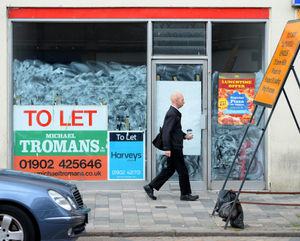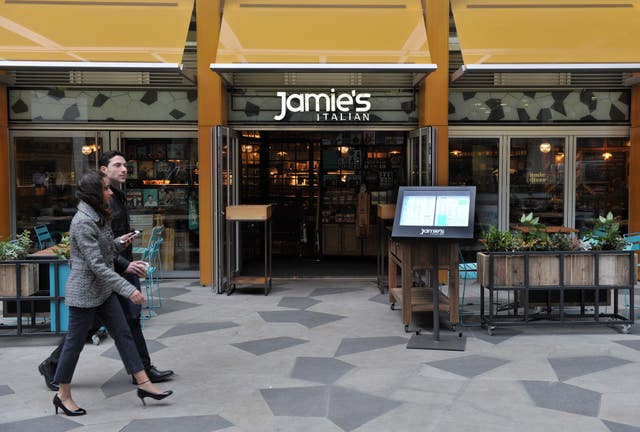14 shops a day closing on the UK high street, report reveals
High street shops closed at a rate of around 14 a day in the first half of the year, while openings were down a third, a report suggests.
In the West Midlands closures of chain stores have hit a record high.
Wolverhampton is one of the worst performers as it lost seven shops overall in the first half of the year, but Stafford was one of the few areas to see growth.
Retailers are battling the worst trading conditions for five years, with the growth of internet shopping and business rates blamed for the challenging climate.

The rise of 'in-home leisure' - people preferring to spend free time and entertain at home rather than go out and about - is also suspected of taking a bite out of earnings.
Italian restaurants including Jamie Oliver's chain are said to have been particularly badly hit by the change, while retailers such as Toys R Us and Maplin have gone to the wall as more people shop online.
Ministers have been urged to take concerted action to help Britain's beleaguered town centres, with experts warning the turmoil is 'unlikely to abate'.
The Government said the recent Budget has 'high streets at its heart'.
Vanished
A study of 500 high streets by accountants PricewaterhouseCoopers and the Local Data Company found 2,692 stores had vanished in the first six month of the year - roughly 14 a day.
The rate is similar to the same period in 2017, although there has been a dramatic fall in the number of openings year-on-year.

Compared with 2,342 shops opening their doors in the first six months of last year, there were 1,569 openings between January 1 and June 30.
Greater London and the South East were the regions worst hit by closures of chains, followed by the Midlands.
In the West Midlands the loss of high street stores hit record levels in the first half of the year; as 134 stores opened on high streets, retail parks and shopping centres, 233 shops shut their doors for the last time.
The net difference between openings and closures over the six months has jumped to a net loss of 89 stores, compared to a loss of just 33 a year ago and a loss of 44 in the first six months of 2016.
Figures in your area
With 30 openings and 36 closures, Birmingham saw a net loss of six shops, but Tamworth saw the biggest net drop in the West Midlands - down nine - followed by Wolverhampton with a net decline of seven shops as 10 opened but 17 closed.
In Walsall four stores opened but chains closed nine of their branches in the town.
In Bloxwich two openings were overshadowed by three closures, while Halesowen suffered four closures and Cannock saw two chain store branches close, but neither saw any openings.
Dudley suffered a net loss of five stores, with just two openings and seven closures, while in nearby Stourbridge there were four openings and five closures.
Harborne and Stafford were the only areas to see growth, although Stafford saw just one closure but two openings..
The West Midlands saw some parts of the high street thriving, with barbers, convenience stores, beauty salons and recruitment agencies all opening a number of new premises across the region.
Whereas there was a fall in the number of estate agents, charity shops and fast food takeaway outlets, reflecting the rising customer demand for online and apps.
Andy Lyon, partner and head of retail at PwC in the Midlands, said: “Our latest research highlights the challenges facing the retail and leisure sectors on Britain’s high streets.
"The continued rate of store closures reflects the new reality of that many of us prefer to shop online and increasingly eat, drink and entertain at home.
"The high street is adapting to an overcapacity in retail and leisure space resulting from these channel shifts.
“Openings simply aren’t replacing the closures at a fast enough rate. Specifically, the openings across ‘experiential’ chains, such as ice cream parlours, beauty salons and vape shops, haven’t been enough to offset closures in the more traditional categories.
“Whilst we are currently seeing a downturn in the West Midlands we are eagerly awaiting the opening of the world’s largest Primark in Birmingham at the Pavillions.
"This key investment in the city is testament to the attractiveness of the city to retailers and will draw much footfall to that area, and indeed visitors into the city.
"It is a shame that the store won’t open for Christmas, as it would have brought a real boost for retailers in the city over the festive period. It also looks hopeful that House of Fraser is staying in the city, which is another iconic high street brand attracting shoppers.
“The British high street is in urgent need of new ways of thinking and new forms of retail. Encouraging this should be a priority, and it remains to be seen if recent packages of support for the high street and reductions in business rates for smaller retailers will be sufficient to stimulate this.”
Challenge
High streets minister Jake Berry said: "The Government recognises the challenges facing high streets driven by changing consumer behaviour.
"That is why the Budget has high streets at its heart. We have created a £675 million fund to help high streets adapt, slashed business rates by a third for the majority of smaller businesses, and are creating a task force guided by Sir John Timpson, one of the UK's most experienced retailers, to ensure that high streets are adapting for rapid change and are fit for the future.
"These measures totalling over £1.5 billion show the Government's determination to make thriving high streets a permanent part of every community in England."
Toys R Us, Maplin, Poundworld and Coast have been among the major fatalities on the high street so far in 2018, while House of Fraser was rescued from administration by Sports Direct founder Mike Ashley. Although stores such as Beatties in Wolverhampton and the HoF branch in Birmingham have won reprieves, others are set for closure.
Debenhams, Marks & Spencer, Mothercare, Homebase and Carpetright have launched closure programmes with varying scales.
Company Voluntary Arrangements (CVAs) have been used with increased frequency as large and established chains struggle to adapt to the changing consumer landscape while being buffeted by headwinds including the increased costs from wages and rates.
Jamie's Italian and Prezzo have announced CVAs, while Gourmet Burger Kitchen and Byron are also utilising the arrangements.




